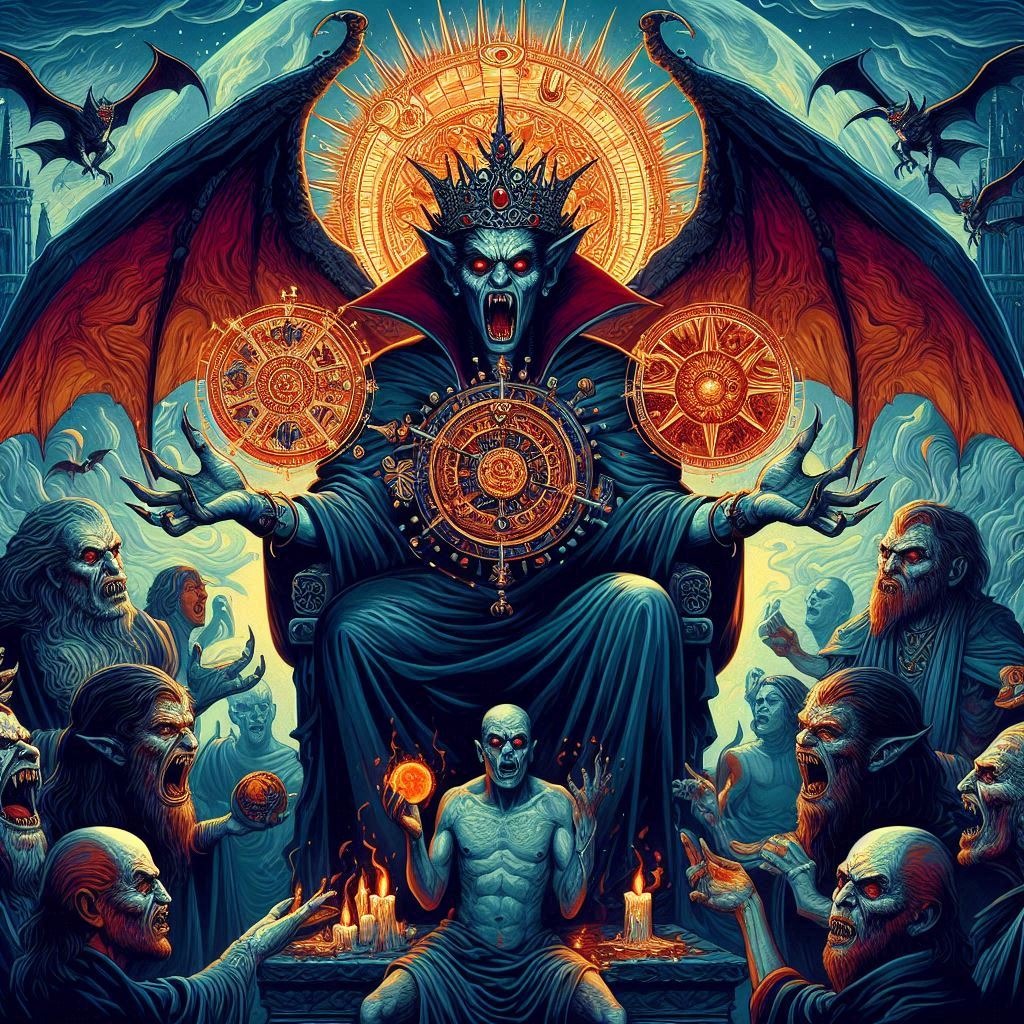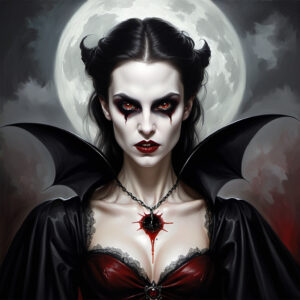
Who Is the Vampire God? The Birth and History of Vampires
Vampires have haunted the human imagination for centuries, evolving from monstrous entities in folklore to complex, romantic figures in modern literature and media. But at the heart of all vampire myths is the idea of a vampire god—a divine or demonic figure who stands at the very origin of the vampire race. This blog explores the concept of the vampire god, how vampires are born in mythology, and their dark history throughout time.
The Vampire God: A Mythological Overview
The notion of a vampire god is rooted in ancient folklore and modern fiction. In some traditions, the vampire god is seen as the original vampire, the being from which all vampires descend. In others, the vampire god represents a divine figure worshipped by vampires, similar to how mortals worship their deities.
One common origin story traces vampires back to Lilith, a figure in Jewish mythology who was said to be Adam’s first wife. She refused to submit to him and fled Eden, later transforming into a demon who fed on the blood of infants and seduced men at night. In many versions of the myth, Lilith is considered the first vampire, and her descendants are the vampires that roam the earth today.
Other interpretations come from ancient religions. In Mesopotamian mythology, the vampire god is often linked to deities or demons like Lamashtu and Lilitu, both of which preyed on humans and were considered precursors to vampires. These creatures fed on the blood of humans, especially children, and were thought to be near-godlike entities with immense power over mortals.
In modern vampire fiction, the vampire god is often depicted as a nearly omnipotent being responsible for creating the first vampire. This figure is sometimes worshipped by vampires as the ultimate source of their strength and immortality.
Vampire Birth: Origins in Folklore
The birth of vampires is surrounded by mystique and fear, with each culture offering its unique perspective on how these creatures came into existence. The concept of vampirism in folklore often begins with a curse or a punishment for wrongdoings, either by a god or a supernatural force.
- Slavic Folklore: In Eastern European traditions, particularly Slavic folklore, vampires were believed to be born from improper burial practices or from individuals who were excommunicated from the church. These vampires, known as strigoi or nosferatu, would rise from their graves to feast on the blood of the living. Some s
- Romanian Vampires: Romanian vampires, particularly in Transylvanian legends, are deeply tied to Dracula, a historical figure who has come to embody the vampire archetype. Vlad the Impaler, a 15th-century prince known for his brutal reign, is often cited as the inspiration behind the modern vampire myth. His legend suggests that his thirst for blood carried over into the afterlife, transforming him into a vampire.
- tories suggest that a person could become a vampire if they died violently or without receiving proper funeral rites.
- Chinese Folklore: In Chinese mythology, the jiangshi are reanimated corpses that suck the life force out of the living. These creatures are often created when a person dies in an unnatural or violent way. Similar to the Western concept of vampires, the jiangshi are soulless beings that wander the earth, searching for victims to sustain their undead life.
In most myths, the birth of a vampire is not a random occurrence but rather a transformation rooted in curses, divine punishment, or a failure of proper death rituals.
Vampire God in Fiction: Modern Interpretations
In modern vampire literature and cinema, the concept of the vampire god is often explored as the originator of vampirism. Popular culture frequently reinterprets the vampire god as a deity-like figure, often more powerful and ancient than regular vampires. Here are some examples of how this figure appears in fiction:
-
- Marvel Comics: In the Marvel Universe, Varnae is considered the first vampire, an ancient being who predates all other vampires. He was created through a dark magical ritual and passed on his vampiric curse to others, making him the ultimate vampire god in this world. Varnae is worshipped by other vampires and is seen as the embodiment of vampire power(
).
- True Blood (HBO): In the TV series True Blood, Lilith is depicted as the first vampire, a primordial being created by God. She is worshipped by vampires as a goddess, and her blood is considered sacred, capable of giving other vampires immense power. Lilith’s role as the first vampire god adds a layer of religious and supernatural intrigue to the show(
).
- Buffy the Vampire Slayer and Angel: In the Buffy and Angel universe, The Old Ones are ancient, god-like demons who predate vampires. Some of these Old Ones, particularly Maloker, are believed to be responsible for the creation of the first vampire. These god-like creatures are feared by all vampires, who see them as their progenitors and rulers(
).
The Evolution of Vampires: From Fearsome Beings to Romantic Icons
The historical image of vampires has changed dramatically over time. Originally seen as monsters and harbingers of disease or death, vampires were feared as bloodthirsty predators that had to be destroyed. These early vampires were portrayed as grotesque creatures with animalistic features, such as in Bram Stoker’s Dracula or F.W. Murnau’s Nosferatu.
However, over the last century, vampires have transformed into more complex characters. Modern interpretations often explore their inner struggles, focusing on their immortality, loneliness, and moral dilemmas. Vampires like Anne Rice’s Lestat or the characters in The Vampire Diaries reflect this shift, presenting vampires as both powerful and tragic figures.
Conclusion: The Vampire God as the Ultimate Source
The vampire god is a powerful and enigmatic figure in both mythology and modern fiction. Representing the ultimate source of vampirism, this god-like being embodies immortality, bloodlust, and divine punishment. From ancient demons like Lilith to modern interpretations like Varnae or Lilith of True Blood, the vampire god is a central figure that continues to shape the mythology and lore surrounding vampires.
As vampires evolve in popular culture, their origins and birth stories remain crucial to understanding their role in human imagination. Whether feared as bloodthirsty demons or admired as tragic immortals, vampires—and their gods—will continue to fascinate and terrify audiences for generations to come.
- Marvel Comics: In the Marvel Universe, Varnae is considered the first vampire, an ancient being who predates all other vampires. He was created through a dark magical ritual and passed on his vampiric curse to others, making him the ultimate vampire god in this world. Varnae is worshipped by other vampires and is seen as the embodiment of vampire power(
-
